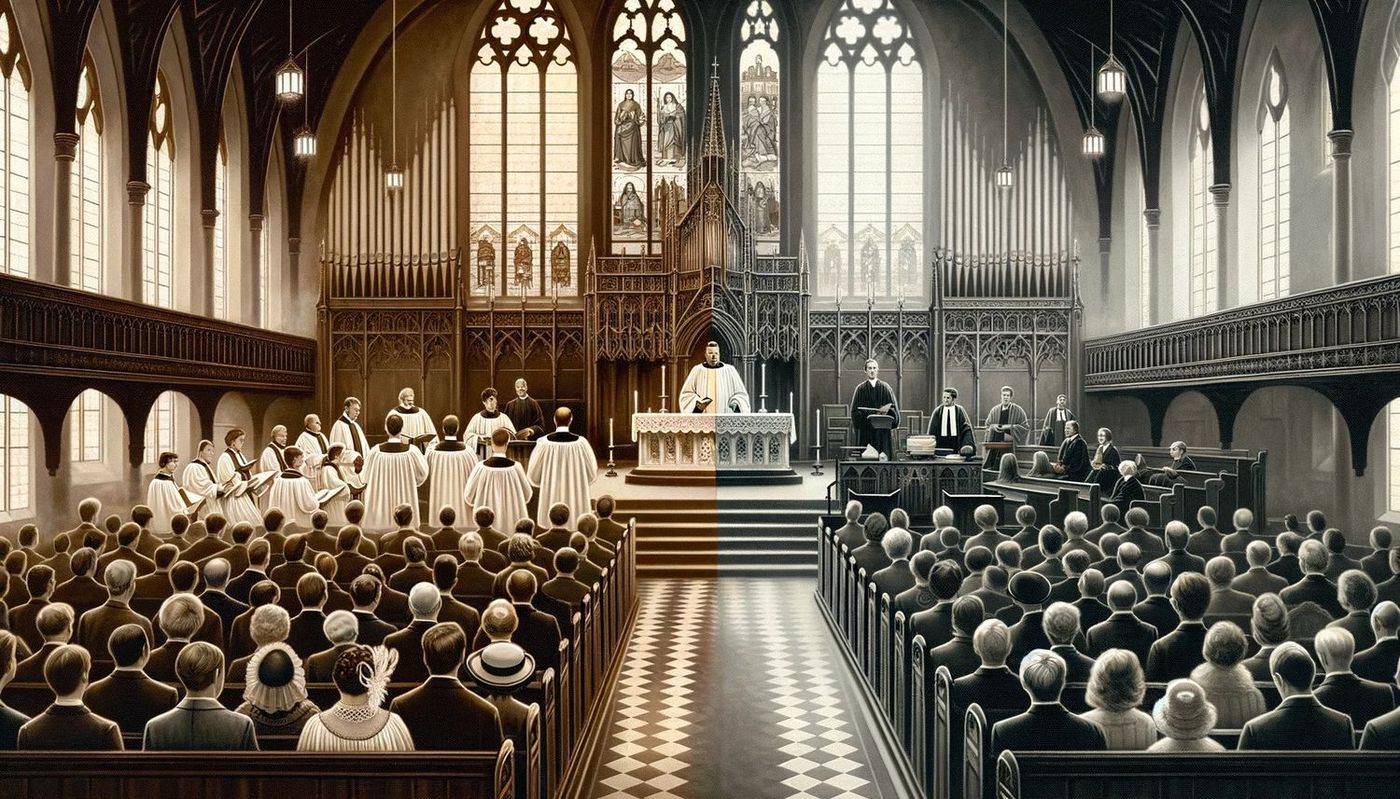Home>Theology and Spirituality>What Is The Difference Between Wesleyan And Baptist


Theology and Spirituality
What Is The Difference Between Wesleyan And Baptist
Published: February 21, 2024
Jason DeRose, Managing Editor at Christian.net, uses his expertise in religion and journalism to deepen understanding of faith's societal impacts. His editorial leadership, coupled with a strong academic background, enriches the platform’s diverse content, earning him recognition in both journalism and religious circles.
Discover the key distinctions between Wesleyan and Baptist theology and spirituality. Explore their beliefs, practices, and historical backgrounds to gain a deeper understanding.
(Many of the links in this article redirect to a specific reviewed product. Your purchase of these products through affiliate links helps to generate commission for Christian.net, at no extra cost. Learn more)
Table of Contents
Introduction
When exploring the rich tapestry of Christian denominations, it's fascinating to delve into the distinct characteristics that define each tradition. Two prominent denominations within the Protestant branch of Christianity, the Wesleyan and Baptist traditions, exhibit unique theological perspectives, worship practices, and organizational structures. Understanding the differences between these two traditions can provide valuable insights into the diverse expressions of faith within the Christian community.
The Wesleyan and Baptist traditions have both played significant roles in shaping the landscape of Protestant Christianity. While they share a common commitment to the authority of Scripture and the centrality of Jesus Christ, they diverge on various theological and practical aspects. By examining their beliefs, worship styles, views on salvation, and engagement with social and political issues, we can gain a deeper appreciation for the nuances that distinguish these two influential traditions.
As we embark on this exploration, it's important to approach the comparison with an open mind and a spirit of curiosity. Rather than seeking to elevate one tradition over the other, our aim is to celebrate the diversity of thought and practice within the body of Christ. By embracing the differences and similarities between the Wesleyan and Baptist traditions, we can foster a spirit of unity and mutual respect within the broader Christian community. Let's embark on this enlightening journey to uncover the distinctive features that set these two traditions apart.
Beliefs and Theology
The Wesleyan and Baptist traditions exhibit unique theological perspectives that shape their beliefs and practices. One of the key distinctions lies in their views on predestination and salvation. Wesleyans, influenced by the teachings of theologian John Wesley, emphasize the concept of prevenient grace, which asserts that God's grace precedes human decision and enables individuals to respond to the Gospel. This perspective aligns with the Wesleyan belief in Arminian theology, which emphasizes human free will in cooperation with God's grace for salvation.
In contrast, Baptists, drawing from the Reformed tradition, hold to the doctrine of unconditional election, which asserts that God's choice in salvation is not contingent on human actions or decisions. This belief, often associated with Calvinist theology, underscores the concept of divine sovereignty in the process of salvation.
Furthermore, Wesleyans emphasize the possibility of entire sanctification or Christian perfection, a transformative experience in which believers are cleansed from sin and empowered for holy living. This emphasis on sanctification as a distinct work of grace sets Wesleyan theology apart from the Baptist tradition, which typically emphasizes the ongoing process of sanctification without a specific doctrine of entire sanctification.
Another significant theological difference lies in their views on the sacraments. While both traditions practice baptism and the Lord's Supper, they hold distinct perspectives on the nature and significance of these ordinances. Baptists generally adhere to believer's baptism, emphasizing the symbolic nature of immersion as a public declaration of faith. In contrast, Wesleyans practice infant baptism and hold a sacramental view of the ordinance, viewing it as a means of grace and initiation into the community of faith.
In terms of broader theological emphases, Wesleyans often highlight the concept of social holiness, emphasizing the transformative impact of the Gospel on society and the call to address social injustices. This emphasis on social engagement and the pursuit of holiness in community sets the Wesleyan tradition apart from some strands of Baptist theology, which may prioritize individual piety and personal salvation.
These theological nuances, rooted in historical and doctrinal distinctives, contribute to the rich tapestry of beliefs and practices within the Wesleyan and Baptist traditions. By appreciating these theological differences, we can gain a deeper understanding of the diverse expressions of faith within the broader Christian landscape.
Worship and Practices
Worship and practices play a pivotal role in shaping the communal and spiritual experiences within the Wesleyan and Baptist traditions. While both traditions share a commitment to the worship of God and the spiritual formation of believers, they exhibit distinct approaches to liturgy, music, and sacramental practices.
In the Wesleyan tradition, worship is often characterized by a sense of vibrancy and emotional expressiveness. Services may feature lively congregational singing, incorporating hymns and contemporary worship songs that celebrate the themes of God's love, grace, and the transformative power of the Gospel. The emphasis on heartfelt worship and the expression of personal devotion reflects the Wesleyan emphasis on experiential faith and the work of the Holy Spirit in the lives of believers.
Furthermore, the Wesleyan tradition places a strong emphasis on the sacrament of the Holy Communion, viewing it as a means of grace and spiritual nourishment for the faith community. The celebration of the Eucharist is often marked by a sense of reverence and spiritual significance, inviting participants to encounter the presence of Christ in a tangible and transformative manner.
In contrast, Baptist worship practices often reflect a more contemplative and reverent approach, emphasizing the expository preaching of Scripture and the proclamation of the Gospel. Hymnody holds a central place in Baptist worship, with congregational singing of traditional hymns that underscore the themes of redemption, faith, and the sovereignty of God. The focus on scriptural preaching and doctrinal instruction aligns with the Baptist commitment to the authority of Scripture and the proclamation of the Word as central elements of worship.
Additionally, Baptists typically emphasize believer's baptism as a significant rite of passage, symbolizing the believer's identification with Christ's death and resurrection. The act of baptism is often conducted through immersion, symbolizing the believer's participation in the death, burial, and resurrection of Jesus Christ.
Both traditions also value the corporate aspect of worship, recognizing the importance of gathering as a faith community to edify, encourage, and uplift one another in the faith. The communal nature of worship fosters a sense of unity and shared spiritual journey among believers, reinforcing the bonds of fellowship and mutual support within the faith community.
By embracing the diverse worship and liturgical practices within the Wesleyan and Baptist traditions, believers can gain a deeper appreciation for the multifaceted expressions of faith and devotion that enrich the tapestry of Christian worship. These distinct approaches to worship and practices reflect the unique spiritual emphases and theological perspectives that define the Wesleyan and Baptist traditions, contributing to the rich diversity of Christian worship worldwide.
Church Structure and Governance
The organizational structure and governance of churches within the Wesleyan and Baptist traditions reflect distinct approaches to leadership, decision-making, and ecclesiastical authority. These differences stem from historical, theological, and practical considerations, shaping the way in which these traditions function as faith communities.
In the Wesleyan tradition, churches often adhere to a connectional polity, characterized by a hierarchical system of governance that emphasizes interdependence and accountability among local congregations. This model, influenced by the Methodist heritage, features a network of conferences, districts, and bishops who provide oversight and guidance to individual churches. The itinerant ministry, in which pastors are appointed to serve specific congregations by the denominational leadership, is a distinctive feature of Wesleyan church governance. This practice reflects the emphasis on shared decision-making and the collaborative discernment of pastoral assignments within the broader framework of the denomination.
On the other hand, Baptist churches typically embrace a congregational polity, emphasizing the autonomy of local congregations in matters of governance and decision-making. This model underscores the priesthood of all believers and the democratic participation of church members in key decisions, including the selection of pastors, the approval of budgets, and the affirmation of doctrinal statements. While Baptist churches may voluntarily associate with regional or national conventions for cooperative missions and fellowship, the local congregation retains a significant degree of independence in matters of governance and administration.
Furthermore, the role of leadership within the two traditions differs in terms of titles, responsibilities, and accountability structures. In Wesleyan churches, pastors may hold titles such as elder, minister, or superintendent, reflecting the connectional nature of their leadership roles within the broader denominational structure. The itinerant system often necessitates periodic reassignments of pastors to different congregations, fostering a sense of adaptability and shared ministry within the Wesleyan tradition.
In contrast, Baptist churches typically recognize the role of the pastor as the spiritual overseer and shepherd of the congregation, often referred to simply as "pastor" or "senior pastor." While Baptist congregations may seek guidance from regional or national bodies for matters of fellowship and cooperative ministry, the local pastor and congregation maintain a significant degree of autonomy in matters of pastoral leadership and decision-making.
These distinct approaches to church structure and governance reflect the diverse ecclesiastical traditions and historical developments within the Wesleyan and Baptist denominations. By understanding these differences, believers can appreciate the varied expressions of leadership and organizational dynamics that contribute to the vitality and diversity of the Christian community.
The unique church structures and governance models within the Wesleyan and Baptist traditions underscore the rich tapestry of ecclesiastical practices and leadership dynamics that shape the communal life and mission of Christian congregations.
Views on Salvation and Predestination
The Wesleyan and Baptist traditions hold distinctive perspectives on salvation and predestination, reflecting their theological emphases and doctrinal frameworks. These perspectives play a significant role in shaping the understanding of God's redemptive work and the role of human agency in the process of salvation.
Within the Wesleyan tradition, influenced by the teachings of theologian John Wesley, the concept of prevenient grace occupies a central position in the understanding of salvation. Prevenient grace is understood as the enabling grace of God that precedes and enables human response to the Gospel. This emphasis on prevenient grace underscores the Wesleyan belief in Arminian theology, which emphasizes the role of human free will in cooperation with God's grace for salvation. According to this perspective, God's grace extends to all individuals, enabling them to respond to the offer of salvation and enter into a transformative relationship with God. This emphasis on the universality of God's grace and the synergistic cooperation between divine grace and human response distinguishes the Wesleyan understanding of salvation.
In contrast, the Baptist tradition, drawing from the Reformed theological heritage, emphasizes the doctrine of unconditional election as part of its understanding of salvation. This doctrine, often associated with Calvinist theology, asserts that God's choice in salvation is not contingent on human actions or decisions. Instead, it emphasizes the sovereignty of God in the process of salvation, highlighting the divine initiative in choosing those who will be saved. This perspective underscores the belief in the eternal decree of God, wherein God unconditionally elects individuals for salvation based on His sovereign will and purpose.
Furthermore, the Wesleyan tradition emphasizes the possibility of entire sanctification or Christian perfection as a subsequent experience following justification. This transformative experience, often viewed as a distinct work of grace, involves the cleansing from sin and the empowerment for holy living. The Wesleyan emphasis on sanctification as an ongoing process aligns with the belief in the potential for believers to experience a deeper level of spiritual maturity and moral transformation.
On the other hand, the Baptist tradition typically emphasizes the ongoing process of sanctification without a specific doctrine of entire sanctification. While Baptists affirm the progressive growth in holiness and the pursuit of moral excellence, they may not emphasize a distinct crisis experience of entire sanctification as found in the Wesleyan tradition.
These differing perspectives on salvation and predestination reflect the theological diversity within the Christian faith, highlighting the nuanced ways in which different traditions interpret and articulate essential doctrines. By understanding these distinct views, believers can gain a deeper appreciation for the theological richness and diversity that characterizes the Christian tradition.
Social and Political Engagement
The Wesleyan and Baptist traditions exhibit distinct approaches to social and political engagement, reflecting their theological emphases and historical contexts. Within the Wesleyan tradition, there is a strong emphasis on social holiness, which underscores the transformative impact of the Gospel on society and the call to address social injustices. This emphasis aligns with the teachings of theologian John Wesley, who advocated for active involvement in social issues and the pursuit of justice as integral aspects of Christian discipleship.
Wesleyans often prioritize community outreach, humanitarian efforts, and advocacy for marginalized and vulnerable populations. The tradition's commitment to social justice is rooted in the belief that the Gospel not only transforms individual lives but also has the power to bring about positive change in the broader societal context. This perspective manifests in various forms of social activism, including initiatives to combat poverty, promote education, advocate for human rights, and address systemic inequalities.
Moreover, Wesleyans historically played significant roles in movements such as abolitionism, labor rights, and civil rights, reflecting a commitment to challenging oppressive structures and promoting the dignity and equality of all individuals. The tradition's emphasis on social engagement extends to contemporary issues such as environmental stewardship, refugee assistance, and efforts to combat human trafficking, demonstrating a holistic approach to addressing pressing social concerns.
In contrast, the Baptist tradition, while also valuing charitable work and community involvement, may place a stronger emphasis on individual piety and personal salvation. Baptists historically championed religious liberty and the autonomy of the local church, advocating for the separation of church and state and the freedom of conscience. This emphasis on religious freedom and individual liberty has shaped the tradition's approach to political engagement, often prioritizing the protection of religious rights and the preservation of individual freedoms.
While Baptists have been involved in social reform movements and charitable endeavors, their approach to social and political engagement may reflect a more decentralized and diverse set of priorities, influenced by the autonomy of local congregations and the diversity of theological perspectives within the tradition. This diversity can result in a range of approaches to social and political issues, reflecting the Baptist commitment to the priesthood of all believers and the freedom of individual congregations to discern their specific areas of focus.
By understanding these distinct approaches to social and political engagement, believers can appreciate the varied expressions of Christian witness and advocacy within the Wesleyan and Baptist traditions. Both traditions, while emphasizing different aspects of social and political involvement, contribute to the broader tapestry of Christian engagement with the world, reflecting the diverse ways in which faith informs action in the public sphere.
Conclusion
In conclusion, the Wesleyan and Baptist traditions, while sharing a common commitment to the Christian faith, exhibit distinctive theological perspectives, worship practices, church structures, views on salvation, and approaches to social and political engagement. The Wesleyan tradition, influenced by the teachings of John Wesley and the Methodist heritage, emphasizes the concept of prevenient grace, entire sanctification, and social holiness, reflecting a robust emphasis on the transformative power of the Gospel in individual lives and society. In contrast, the Baptist tradition, drawing from the Reformed theological tradition, emphasizes unconditional election, believer's baptism, and a diverse range of approaches to social and political engagement, reflecting a commitment to individual piety and religious liberty.
By exploring the differences and similarities between these two traditions, we gain a deeper appreciation for the rich diversity of thought and practice within the broader Christian community. Rather than seeking to elevate one tradition over the other, it is essential to recognize the value of theological diversity and the various ways in which different traditions contribute to the multifaceted tapestry of Christian faith.
Furthermore, this exploration invites us to embrace a spirit of unity and mutual respect, recognizing that the body of Christ encompasses a wide array of traditions, each offering unique insights and expressions of faith. By understanding the distinct theological emphases, worship practices, church structures, and social engagements within the Wesleyan and Baptist traditions, we can foster a spirit of appreciation for the diverse ways in which Christians seek to live out their faith and engage with the world.
Ultimately, the differences between the Wesleyan and Baptist traditions serve as a reminder of the richness and complexity of the Christian faith, inviting us to celebrate the various expressions of Christian belief and practice that contribute to the vibrant tapestry of the global Church. As we navigate the distinct theological landscapes and practical expressions of these traditions, may we approach our interactions with humility, openness, and a genuine desire to learn from one another, recognizing that each tradition has valuable contributions to offer to the broader body of Christ.















Read more: What Is The Difference Between Baptist And Mennonite